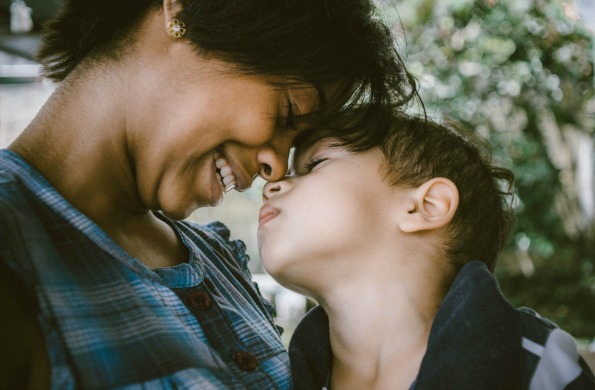Members of The Church of Jesus Christ of Latter-day Saints believe in God and in Jesus Christ—the very same ones found in the Holy Bible. Of course, there are a few things we know about Him that others have lost or forgotten, but the most important thing is that we know God loves us and is our Father in Heaven. Today, we’re going to take a brief look at who we know God to be, and I am going to demonstrate how some of the things I know about God helped me learn how to parent. I wasn’t the perfect parent, but like most parents, I tried my best. The more closely I studied how God parents, the better I did at my own parenting.
God Loves Us Even When We’re Imperfect
 Everything starts with God’s love, and as members of the Church, we have a particularly powerful reason to believe God loves us personally. We believe we lived with Him after our spirits were created. This was before we came to Earth to receive bodies. We built a personal relationship with God at that time. He knew us and we knew Him, and so, when He plans for us, it is all done knowing who we are, and it is the result of a very powerful and very personal parental love. That love impacts every decision He makes about the world and about us.
Everything starts with God’s love, and as members of the Church, we have a particularly powerful reason to believe God loves us personally. We believe we lived with Him after our spirits were created. This was before we came to Earth to receive bodies. We built a personal relationship with God at that time. He knew us and we knew Him, and so, when He plans for us, it is all done knowing who we are, and it is the result of a very powerful and very personal parental love. That love impacts every decision He makes about the world and about us.
I have sometimes been told that Latter-day Saints live their lives thinking God hates them when they sin. This is not true. Every parent knows we still love our children when they are doing something wrong. We are sad when they make mistakes, but we still love them. We know they are not going to be perfect, and God knows we aren’t going to be perfect. We teach our children how to repent, as God taught us to repent, and we do our best to help them progress towards the person we know they can be. God’s love for us on our worst days helped me to remember to be loving on my children’s worst days.
God Makes Rules Because He Loves Us
Some people think our faith has too many rules—with some thinking even one rule is too many. As a parent, I learned that having rules for my children was important. When I babysat for children before my marriage, I saw how cruel it was to let children live without rules. I saw children who were not welcome anywhere because they had no self-discipline, no concern for anyone but themselves, and no training in how to behave. I vowed to make sure my children would be welcome in the world, and that meant giving them rules.
 Rules also kept my children safe. They used car seats, weren’t allowed to use the stove without supervision, ate healthy foods, and followed other safety rules. They didn’t always appreciate the rules when they were young, but as adults, two of whom are parenting their own children, they understand them now.
Rules also kept my children safe. They used car seats, weren’t allowed to use the stove without supervision, ate healthy foods, and followed other safety rules. They didn’t always appreciate the rules when they were young, but as adults, two of whom are parenting their own children, they understand them now.
Heavenly Father gives us rules for the same reason. He wants us to be physically, spiritually, and emotionally safe. The rules, which are known as commandments, help us to do that. He doesn’t want us to be lazy, immoral, unkind, and unfocused people. We can choose to be, but He provides all the rules we need to help us become worthy to return home to Him someday and also to live great lives today. We avoid so many of life’s trials by circumventing many things the world considers acceptable (even when the evidence shows those practices are bad for us).
God has a Plan for Us
When God created us, He had a plan. Actually, He had a lot of plans. He had a master plan for all His children as a family, but He also had individual plans for each one of us. Our personal plans are the result of having gotten to know us personally before we were born, because we lived with Him after our spirits were created.
 These plans mean that the commandments He makes, the events He has happen to us (or allows to happen), and the situations we find ourselves in often have a purpose. He has certain things He wants us to learn and certain ways He wants us to grow. He plans to make them all possible. While we can’t always be forced to take on the opportunities, they are offered to us.
These plans mean that the commandments He makes, the events He has happen to us (or allows to happen), and the situations we find ourselves in often have a purpose. He has certain things He wants us to learn and certain ways He wants us to grow. He plans to make them all possible. While we can’t always be forced to take on the opportunities, they are offered to us.
When I raised my own children, I also had goals—goals for us as a family and goals for each child. I worked to create situations that would help those goals happen. I had a child with special needs, so I scheduled in the therapy I had to do and also arranged for her to do things that would allow her to progress as far as she could, which turned out to be further than many doctors thought possible. When I informed one doctor my child had learned to ride a bike, he said that was impossible. I told him that fortunately, no one had told her that. I wanted to be like God in that way. He often puts me into situations no one thinks I can do, and even more often into situations I don’t think I can do, so that I can learn I can indeed do them.
God Has a Plan, But Gives Us Agency
 One of the hardest parts of parenting for me was letting go and allowing my children some agency. I noted, however, that God gives His children the right to make choices for themselves, so I tried to give my own children choices. We began with simple choices: “Do you want to wear the blue dress or the pink dress?” We worked our way up to the bigger choices: “What kind of science do you want to study next semester?” “What career do you have in mind?” “Is that a party you feel comfortable attending?”
One of the hardest parts of parenting for me was letting go and allowing my children some agency. I noted, however, that God gives His children the right to make choices for themselves, so I tried to give my own children choices. We began with simple choices: “Do you want to wear the blue dress or the pink dress?” We worked our way up to the bigger choices: “What kind of science do you want to study next semester?” “What career do you have in mind?” “Is that a party you feel comfortable attending?”
It wasn’t easy, but I understood why God gives us agency—and I suspect it isn’t always easy for Him, either. It’s hard to let your children make choices when you know they are wrong. Sometimes, though, the only way we learn is by doing things incorrectly and then fixing them. Sometimes, we just need to choose who we want to be. I matched the amount of agency to their age, of course, as responsible parents do, but I did give it to them.
God Allows Us to Experience Consequences
Choices have consequences. We can choose what to do, but we can’t avoid the consequences, either to ourselves or to others. This is good, because consequences often help us to see for ourselves what is good and what isn’t. Negative consequences often help us to find the motivation to change.
God isn’t ignoring us when He lets us face the consequences. He is there and He is sad that we are having to suffer. He wants us to see for ourselves that we’ve made a bad choice and to decide for ourselves to change. We can go to Him for help when we’re truly ready to do that. As a mother, I tried to do the same thing—to be there when my children were ready to make a better choice and to believe they were capable of doing that.
God Really Wants Us to Return Home Someday
When I had my first child, I sat down and made a list of my goals for her. Of course, as I became more experienced at parenting, I altered some of those goals, but I always worked from my goals as I made choices for my family. I wanted them to have the very best mortal and eternal life possible.
Heavenly Father has mortal and eternal goals for us, and they are perfect. Focusing our lives on achieving God’s goals for us is one of the greatest gifts we can offer Him. He wants us to return safely home to Him. He knows it isn’t easy—but He also did everything He could to make it possible. However, eternity is up to us. His longing for us to return home is powerful, but in the end, it is entirely up to us to decide how much that return means to us. Does it mean enough that we’re making the necessary sacrifices, giving up our sins, repenting, and keeping the commandments? Are we staying focused on eternity?
I set out to be a good parent, and I could find no better role model than God Himself.
This post was originally published on October 2, 2014. Minor changes have been made.
The late Terrie Lynn Bittner—beloved wife, mother, grandmother, and friend—was the author of two homeschooling books and numerous articles, including several that appeared in Latter-day Saint magazines. She became a member of the Church at the age of 17 and began sharing her faith online in 1992.







